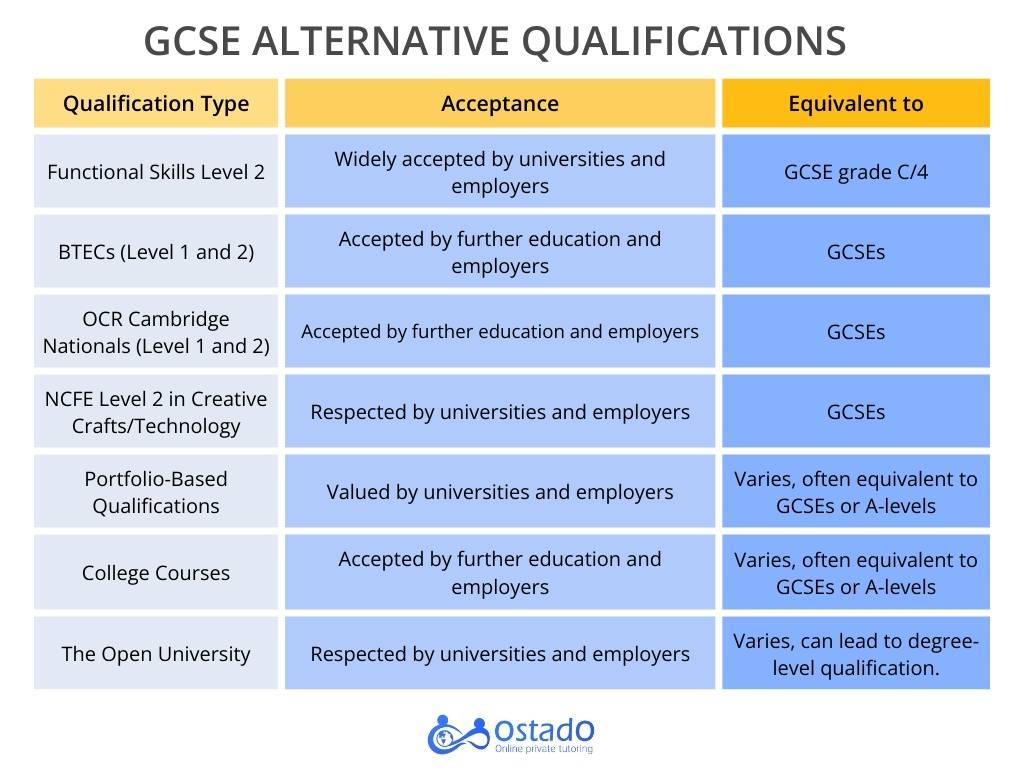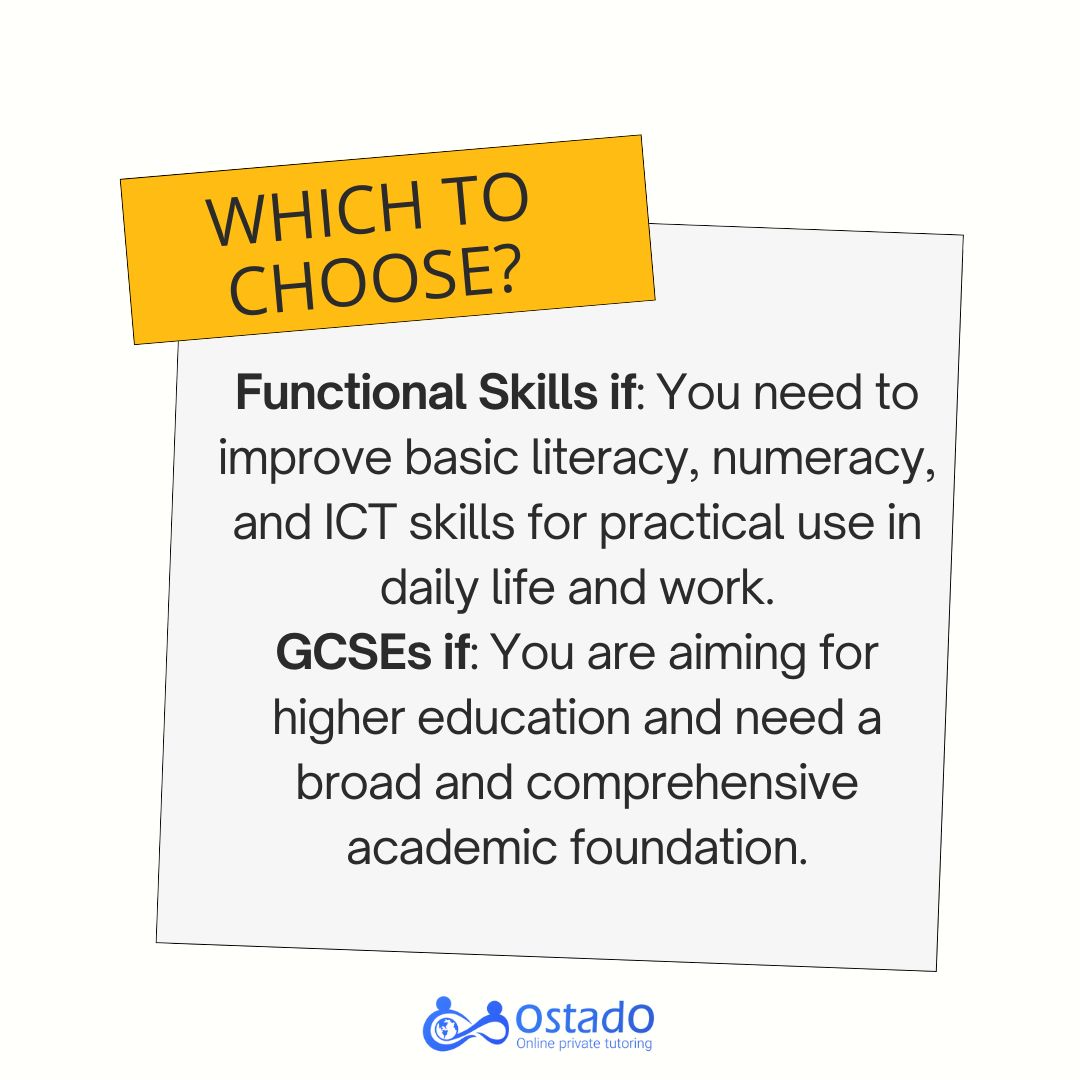Did you know that not all universities in the UK force GCSEs? Some qualifications alternative to GCSEs are as valuable as others.
Alternatives to GCSEs can provide a more practical approach to learning tailored to different strengths and interests. The most popular options are functional skill courses and apprenticeships.
What are the options that could better suit your needs? Let’s explore these alternatives to find a path that helps you achieve your goals.
Functional Skills Courses
The UK Government devised Functional Skills Level 2 courses to improve literacy and numeracy skills. They are equivalent to GCSE grade C/4 and above.
Functional Skills focus on developing abilities for everyday situations, whereas GCSEs focus on academic theory. These courses help you apply your knowledge in practical, real-world contexts, making them highly relevant for daily life and work.
Most universities and employers accept Functional Skills Level 2 Qualifications. These programmes give you practical problem-solving abilities that help you perform your duties successfully, making you a strong candidate in both the job market and higher education.
Available Subjects and Qualifications
- Maths: Using numbers in real-life situations.
- English: How to write clear and concise emails, reports, and other documents, as well as how to communicate effectively in various settings.
- ICT (Information and Communication Technology): Essential digital skills, generally work-related.
1. BTECs (Business and Technology Education Council)
You will learn practical career-related skills. Healthcare, business, creative arts and engineering are among the 2000 available courses.
BTECs involve completing the units and presenting evidence based on real-life work and studies. You won’t be sitting exams.
What Are They Equivalent To?
- Level 1 and 2: Equivalent to GCSEs. Valuable for further education and entry-level employment.
- Level 3: Equivalent to A-levels. These are more advanced and can help you get into university or higher-level apprenticeships.
What Are The Different Types of BTEC?
- BTEC Firsts: introduction to work in a vocational sector. Available from entry level to Level 2. Can lead to employment or apprenticeship.
- BTEC Nationals: available from Level 3. Can lead to employment or professional development.
- BTEC Apprenticeships: available at Levels 2 to 5.
2. OCR Cambridge Nationals
OCR Cambridge Nationals offers practical learning to prepare you for further education or employment. IT, Health and Social Care, and Sports are among the covered subjects.
Acceptance and Recognition
Many universities and employers accept OCR Cambridge Nationals as equivalent to GCSEs or A-levels, depending on the level of the qualification. To gain more insight, please read Recognition and acceptance, Cambridge International Education.
What Are They Equivalent To?
- Level 1 and 2: Equivalent to GCSEs. Can help you move on to further education or entry-level employment.
- Level 3: Equivalent to A-levels. Can help you get into university or higher-level apprenticeships.
3. NCFE Level 2 Qualifications
Looking for a different path to traditional GCSEs? NCFE Level 2 Qualifications in Creative Crafts and Technology are what you need! These courses are perfect for those who enjoy experiential learning.
NCFE Level 2 courses offer a fantastic way to showcase your talents and build your knowledge.
What Are The Available Subjects?
-
- Creative crafts
- Technology
- Mental health
- Sport
4. Portfolio-Based Qualifications
Creating a portfolio helps you gain recognition for your talents. Many universities and employers value these qualifications.
The Arts Award and Edexcel Project Qualification (PQs) are great examples of portfolio-based qualifications. There are 3 available levels of the qualification.
Through practical learning, you will gain recognition for your skills and talent. PQs also help you improve your analysis and critical thinking skills. Universities and employers value these qualifications.
5. College and Apprenticeship Routes
Colleges provide vocational training courses to teach practical skills for specific employment. If you enjoy structured learning, these routes are excellent for you.
With apprenticeships, you can earn while you learn. You will also gain valuable work experience and qualifications. Apprenticeships are available in many industries, including technology, construction, and creative arts.
Employers highly regard both college courses and apprenticeships.
6. The Open University and Alternative Pathways
The Open University provides flexible online courses to fit your schedule with various subjects. The courses are ideal for homeschoolers or those balancing their studies with other commitments.
The Open University’s highly respected courses can lead to higher education and professional opportunities.

Other Alternative Pathways
In addition to The Open University, there are many other alternative pathways to consider. Coursera, edX, and FutureLearn offer courses from top universities worldwide. These platforms often provide both free and paid courses.

What Happens If You Fail a GCSE?
Many students worry about the hardest GCSE exam board and what to do if they fail. Exam resit is a solid option.
You can resit your GCSE exams until you get the desired results. Need help with your upcoming GCSE exams?
Our devoted GCSE tutors at Ostado are here to help. With personised learning plans tailored to your learning style and level, you will achieve the best results. We believe that with the proper techniques, every student succeeds.
What Universities Accept Alternative GCSEs?
Alternative qualifications can provide a different way to demonstrate your knowledge and skills. That’s why many universities accept alternative qualifications.
You can always check your desired university’s website for entry requirements. UCAS is also an excellent resource for researching accepted qualifications.
Alternative to GCSE FAQ
- Are there alternatives to GCSE?Yes, there are several alternatives to GCSEs accepted by universities and employers. Some examples are functional Skills courses, BTECs, OCR Cambridge Nationals, and portfolio-based qualifications. These alternatives focus on real-world skills and can be just as valuable for further education.
- What courses are equivalent to GCSE?Courses equivalent to GCSEs include Functional Skills Level 2, BTECs at Levels 1 and 2, and OCR Cambridge Nationals. They are widely accepted by universities and employers, making them a great alternative.
- What will replace GCSEs?There is no official replacement for GCSEs, but many alternative qualifications are gaining popularity. Functional Skills and OCR Cambridge Nationals provide different learning experiences focusing on practical skills.
- What can I do if I have no GCSEs?If you have no GCSEs, plenty of opportunities are available. You can pursue Functional Skills courses, BTECs, or apprenticeships to gain valuable skills and qualifications.

